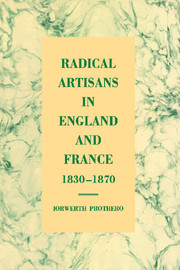Book contents
- Frontmatter
- Contents
- Acknowledgements
- List of abbreviations
- Introduction
- 1 Artisans
- 2 Radicalisms
- 3 Trade unionism
- 4 Work and radicalism
- 5 Socialism
- 6 Co-operation
- 7 Class and radicalism
- 8 Political action and organisation
- 9 Education and civilisation
- 10 Religions and philosophy
- 11 The culture of radical clubs
- Conclusion
- Notes
- Select bibliography
- Index
4 - Work and radicalism
Published online by Cambridge University Press: 24 November 2009
- Frontmatter
- Contents
- Acknowledgements
- List of abbreviations
- Introduction
- 1 Artisans
- 2 Radicalisms
- 3 Trade unionism
- 4 Work and radicalism
- 5 Socialism
- 6 Co-operation
- 7 Class and radicalism
- 8 Political action and organisation
- 9 Education and civilisation
- 10 Religions and philosophy
- 11 The culture of radical clubs
- Conclusion
- Notes
- Select bibliography
- Index
Summary
The divisions, hierarchies, antagonisms and exclusiveness in the workplace and in labour organisations, and the fact that wider combinations were mainly over wages and hours, would seem a poor basis for movements for political democracy and egalitarianism. Yet trade union leaders were often radicals, seeking to reform their organisations, combat selfishness and educate the members. Furthermore it was easier to unite trade societies in common movements for political rather than economic goals. Not only were trade societies involved in politics, there were other important links between work and radicalism, including the language of industrial conflicts, and the importance of work groups and trade societies as means of mobilisation for radical political action.
Trade unions and politics
As was indicated in the previous chapter, three features in trade unionism encouraged political action. The first was a tendency of trade societies to act as political lobbies in the interests of their industry. It was particularly common for depressed trades in Britain, including those of tailors, cabinet-makers and carpenters, to press for legislative protection because they could see no other ways of improving their position. Bakers' societies engaged in repeated public campaigns to collect and publish evidence on their working conditions and to press for legislation. This was particularly the case when the government or state was seen as the source of the evils complained of, such as the cheap labour in prisons, the armed forces, the poorhouses, and convents, or the government, military, naval, or police orders to low-paying or sweating firms.
- Type
- Chapter
- Information
- Radical Artisans in England and France, 1830–1870 , pp. 94 - 119Publisher: Cambridge University PressPrint publication year: 1997

